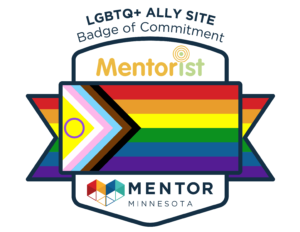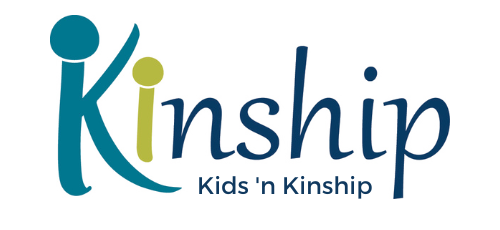LGBTQ+ Ally
Kids ‘n Kinship Seeks to serve all participants in a safe, inclusive, and accepting way.
Kids ‘n Kinship’s ALLY Vision Statement
All youth and volunteers who seek Kids ‘n Kinship shall be provided a welcoming and supportive environment in our program offerings, amongst interactions with staff, and in building positive relationships with their volunteer Mentor(s) and Mentee(s).
Targets/goals:
 In an effort to be inclusive and affirming we aim to diligently work to improve program inclusivity for youth and volunteers of all Sexual Orientations Gender Identities and Expression identities.
In an effort to be inclusive and affirming we aim to diligently work to improve program inclusivity for youth and volunteers of all Sexual Orientations Gender Identities and Expression identities.- We will review, amend, and incorporate Policies and Practices as guided by the Elements of Effective Practice in the LGBTQ Supplement.
- We will work towards diversifying and expanding our already robust recruitment, referral, screening, training, matching, and supervision to reflect a more inclusive and affirming program for all youth and adults who wish to be a part of Kids ‘n Kinship.
- As a program, we will continue to be reflective and intentional to reach all youth who are in need of additional adult support. Regardless of social, political, or value bias that may exist in society we have as a program set out to strive to be inclusive and accepting to youth who identify need, especially those populations whose need is especially present and evident. These indicators include, but are not limited to: (SEL barriers and deficits, isolation or loneliness, mental health diagnosis, family system dynamics, or youth who identify as LGBTQ+)
The research and statistics below highlight that the work we are doing to an affirming youth serving program – using and respecting personal pronouns, creating safe spaces and affirming programming – makes a difference!
TransStudentEducationalResources – www.transstudent.org/homelessness
- LGBTQ youth experience many hardships, but perhaps one of the biggest is homelessness – 40% of homeless youth are LGBTQ
- 68% of homeless LGBTQ youth have experienced family rejection
- 320,000 to 400,000 LGBTQ youth face homelessness in the US each year
Trevor Project National Survey
This survey provides critical insights around LGBTQ youth mental health disparities, discrimination, housing instability, barriers to affirming health care, subjection to conversion therapy, and suicide. The survey also highlights how safe spaces and social support positively impact the well-being of LGBTQ youth.
Among some of the key findings of the report from LGBTQ youth in the survey:
- 68% of LGBTQ youth reported symptoms of generalized anxiety disorder in the past two weeks, including more than 3 in 4 transgender and nonbinary youth
- 48% of LGBTQ youth reported engaging in self-harm in the past twelve months, including over 60%of transgender and nonbinary youth
- 1 in 3 LGBTQ youth reported that they had been physically threatened or harmed in their lifetime due to their LGBTQ identity
- 61% of transgender and nonbinary youth reported being prevented or discouraged from using a bathroom that corresponds with their gender identity
Trevor Project 2021 survey results on mental health of LGBTQ youth, which sheds light on the experiences of over 35000 young people between 13 and 24.
Some key findings about challenges that LGBTQ youth are facing:
- 42% of LGBTQ youth seriously considered attempting suicide in the past year, including more than half of transgender and nonbinary youth.
- 94% of LGBTQ youth reported that recent politics negatively impacted their mental health.
- 48% of LGBTQ youth reported they wanted counseling from a mental health professional but were unable to receive it in the past year.
- 30% of LGBTQ youth experienced food insecurity in the past month, including half of all Native/Indigenous LGBTQ youth.
Key findings about what adults and allies can do to make a difference:
- Transgender and nonbinary youth who reported having pronouns respected by all of the people they lived with attempted suicide at half the rate of those who did not have their pronouns respected by anyone with whom they lived.
- Transgender and nonbinary youth who were able to change their name and/or gender marker on legal documents, such as driver’s licenses and birth certificates, reported lower rates of attempting suicide.
- LGBTQ youth who had access to spaces that affirmed their sexual orientation and gender identity reported lower rates of attempting suicide.
- Only 26 percent say they always feel safe in their school classrooms — and just five percent say all of their teachers and school staff are supportive of LGBTQ people;
- Sixty-seven percent report that they’ve heard family members make negative comments about LGBTQ people.
What we hope to accomplish:
Putting our Program’s Mission and Values into practice, along with the guidance from the Elements of Effective practice LGBTQ+ supplement to understand how we can put into practice a welcoming and supportive place for all LGBTQ+ youth and volunteers. Through our combined efforts, we will incorporate LGBTQ-affirming mentorship program practices that offer our mentors and mentees of all identities an enriching, supportive, and nurturing experience.
Take a few moments to fill out this SURVEY to let us know you’re interested!
